Why are men turning their back on the world? 🙅♂️
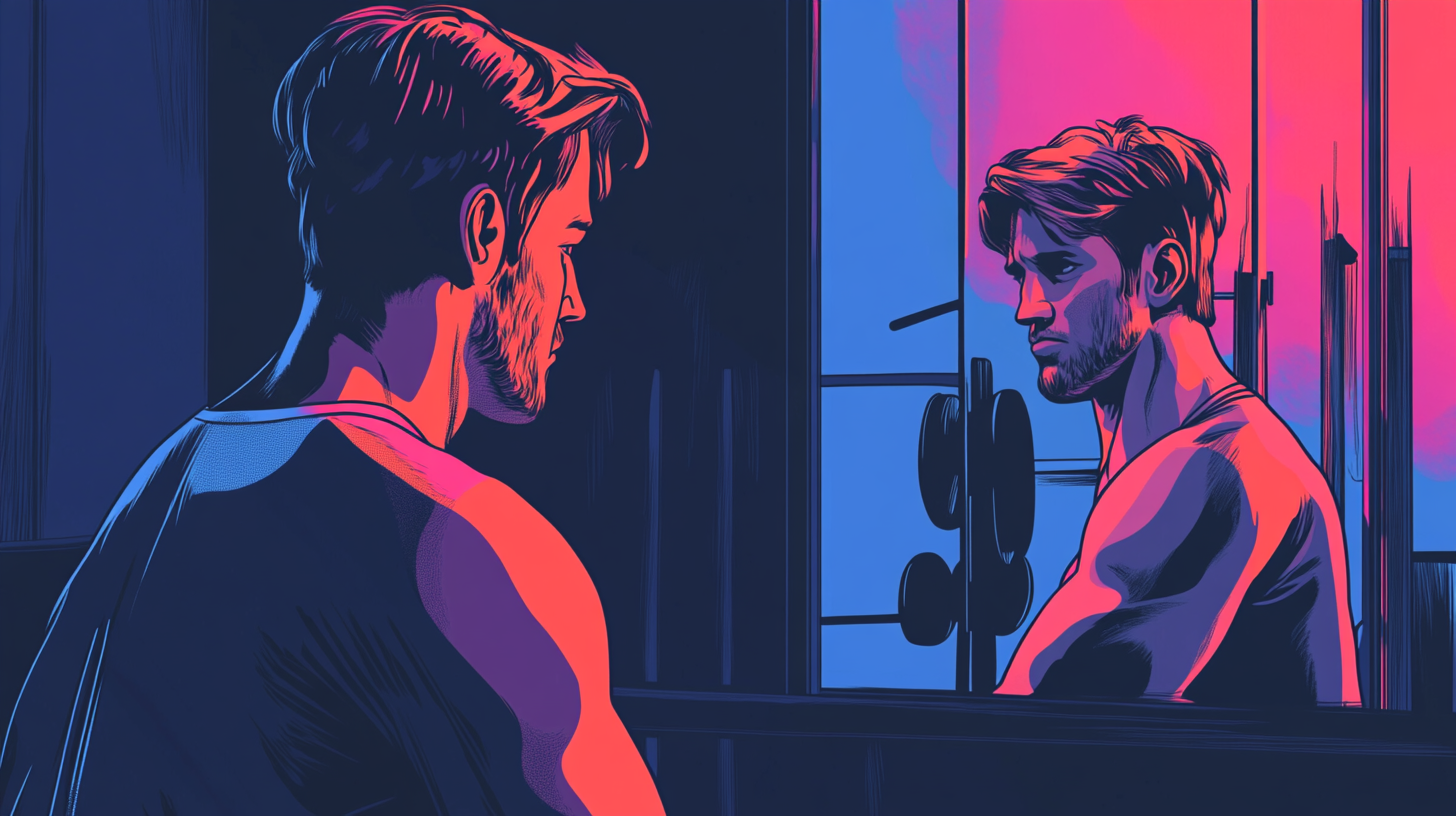

👆👆Podcast version of this week's newsletter above!👆👆
More solitude! Oh yes, continuing from last week’s newsletter, I’m taking a closer look at how the modern age is doing strangely unique things to us and our relationships.
While last week was all about how we’re all feeling the effects of solitude, this week I’m taking a closer look at how that’s playing out with men. In particular, how men are increasingly eschewing relationships in favour of a distinct form of individualism.
Ready? Onwards!
Man-o-Man 🙆♂️
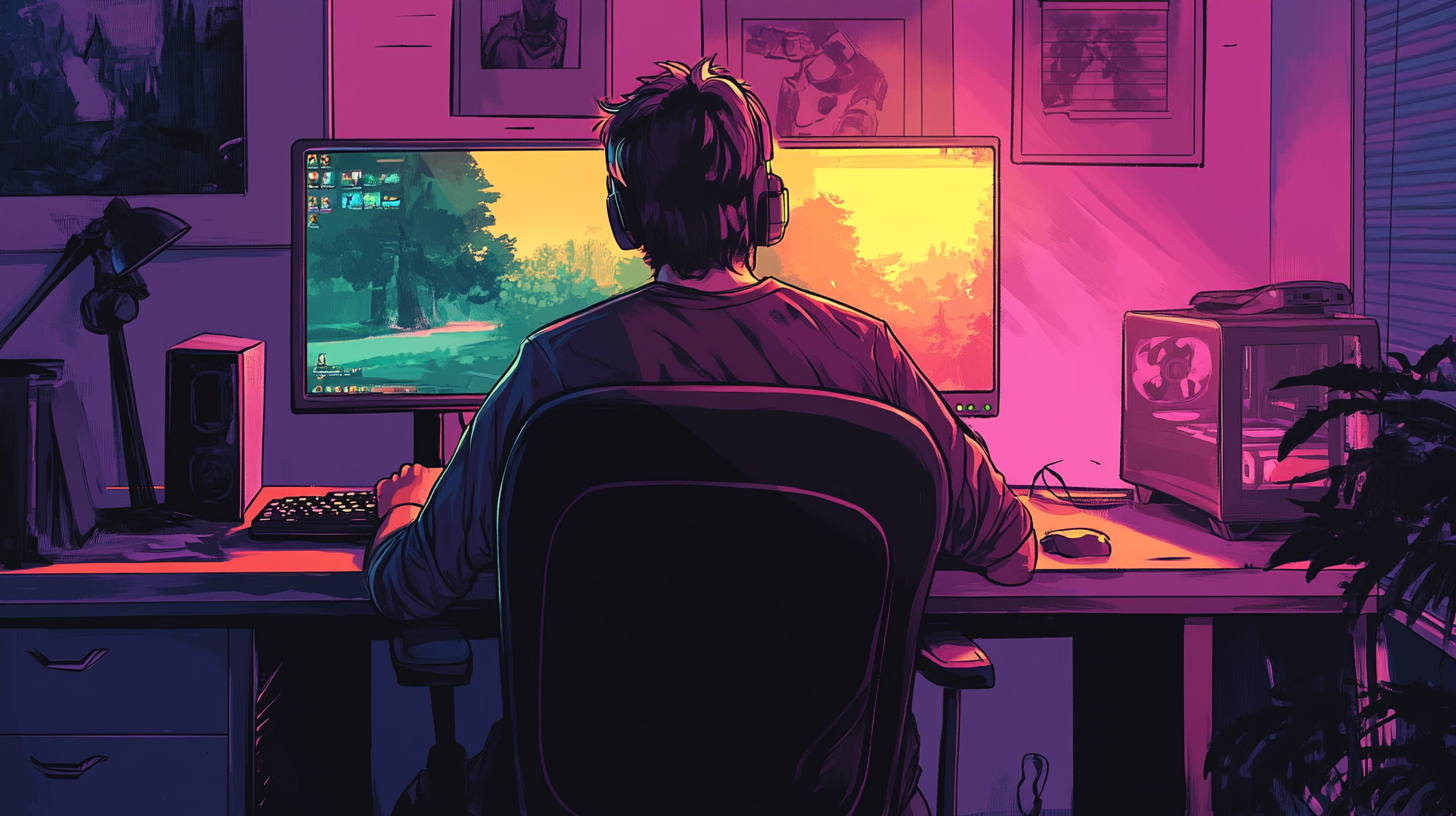
Men (and women) are spending more time alone, according to the Institute of Family Studies. In its research, just 20% of 25-year-old women and 23% of 25-year-old men have ever married today. These are close to the lowest levels ever observed.
While we can easily bat those numbers away by saying that people are settling down later on in life, those figures actually worsen as we age. Marriage is at historic lows for 35-year-old and 45-year-old men and women. Only about 60% of 35-year-old men marry, down from 90% in 1980. This trend also suggests that a growing share of adults will not get married before their healthiest years are long past them.
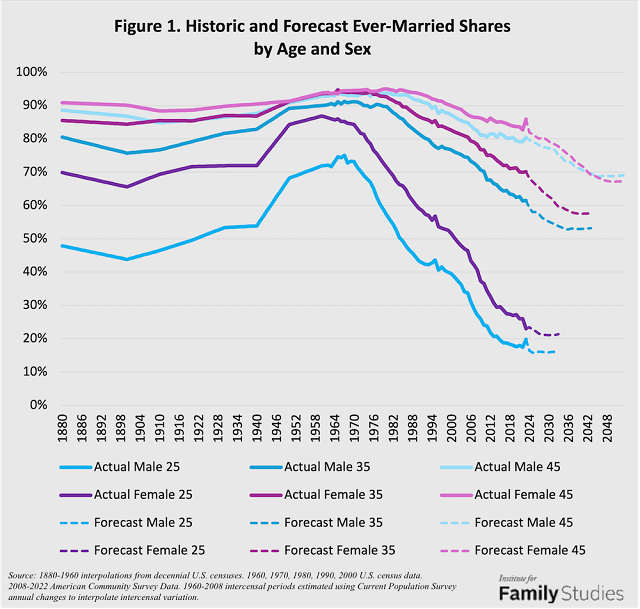
Now, marriage is not the only measure of whether people are in relationships, and it would be silly to suggest only men are not marrying, and that women remain somehow unscathed. But the impact on men and women is diverging - I’ll also be looking at the impact of solitude on women in a later newsletter.
The bigger trend is that people are having fewer relationships, and it starts when we’re teenagers. A survey found that only 56 percent of Gen Z women—and 54 percent of Gen Z men—said they were involved in a romantic relationship at any point during their teenage years. Sounds quite normal you might think? Until you compare that same age against previous generations. Among Baby Boomers, 78% said they’d had a significant partner as a teenager, while for Gen Xers it was 75%.
What gives? Well, lots of reasons: technology is a big one, but I’m going to push past the why and focus more on the impact. If you want to dig into that there’s a great essay from the American Institute for Boys and Men on the topic.
Young people see relationships as less of a priority, that’s clear. But what happens in the second decade of life has implications for what might come later on. Research shows that these early relationship experiences are associated with long-term commitments.
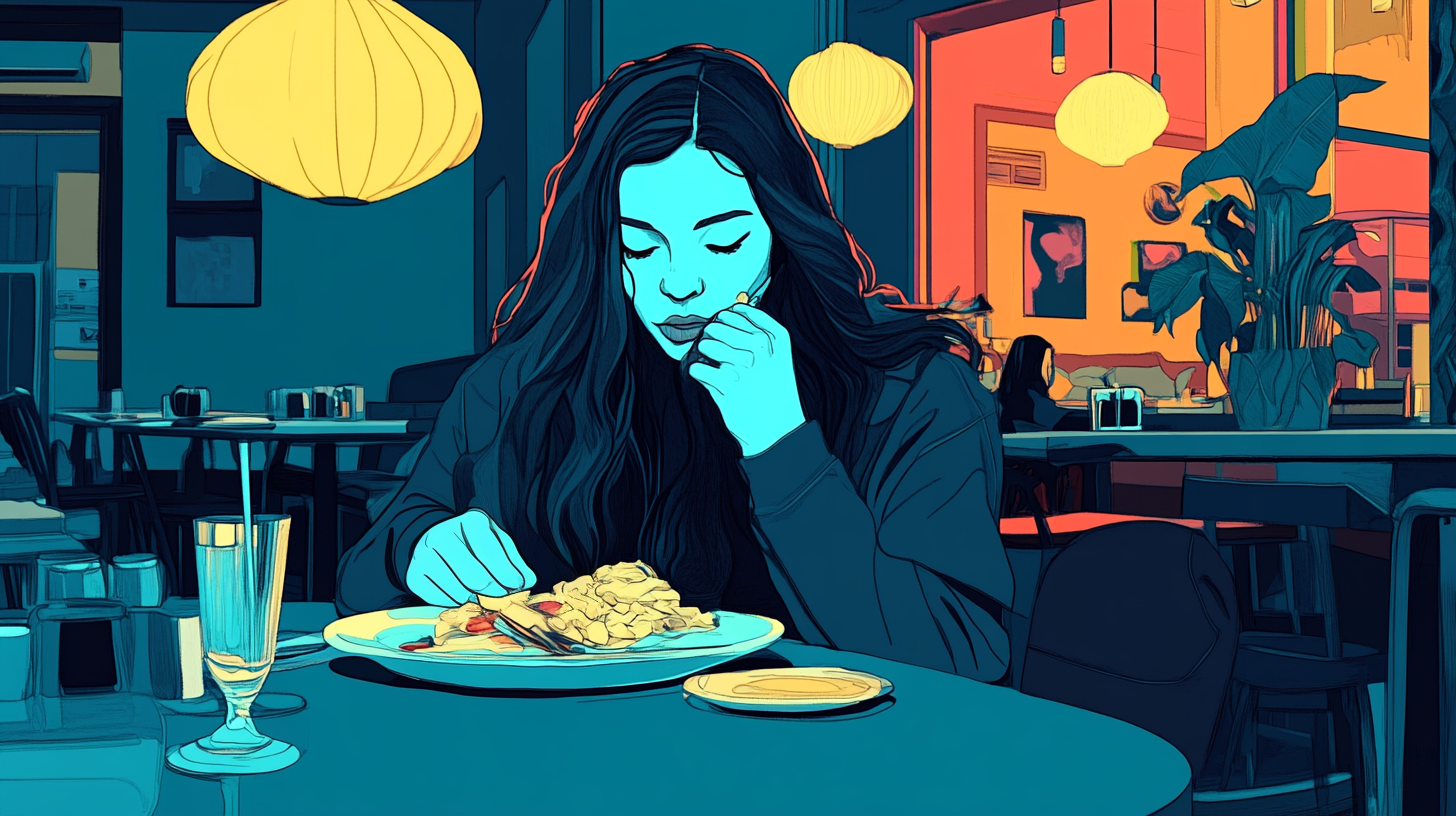
People who had a romantic relationship as teenagers are more likely to be married today or to be in a committed relationship. Sixty-two percent of Americans who had a steady girlfriend or boyfriend during most or all of their teenage years report being married today, compared to less than half (46 percent) of those who did not.
This effect cascades into health outcomes too. People in relationships live longer, have fewer health problems, and are less likely to need hospital or financial support.
So now we know relationships aren’t a big priority for men and women in their younger years. But what that does to each group differs wildly.
Me Time 💆♂️

In 2020, philosopher Andrew Taggart noticed something. When we looked around at the men in his world, he saw something strange: men were increasingly becoming fixated on three things:
- Mastering their body.
- Mastering their bank account.
- Mastering their minds.
Taggart called these men “secular monks” because of their religious like obsession over mastering, well, themselves. “Practitioners submit themselves to ever more rigorous, monitored forms of ascetic self-control,” he wrote, “among them, cold showers, intermittent fasting, data-driven health optimization, and meditation boot camps.”
Taggart was onto something. Eighty-two percent of US consumers now consider wellness a top or important priority in their everyday lives. which is similar to what consumers in the United Kingdom and China report (73 percent and 87 percent, respectively). This is especially true among Gen Z and millennial consumers, who are now purchasing more wellness products and services than older generations. And among that group, men are growing faster than women.

Throw a stone into the pond of male public figures who have broad appeal to men and you’ll find:
- Jordan Peterson
- Russell Brand
- Andrew Tate
- Joe Rogan
- Tim Ferriss
- Andrew Huberman
- And dozens of others.
What is unifying among this motley bunch is an obsession with self-improvement, with the emphasis firmly on the self. There is little interest, and sometimes hostility towards people and or relationships that detract from that.
Now, you might ask: what’s wrong with men taking better care of themselves? And the answer is: absolutely nothing. But a more interesting question to ask is: if men are now increasingly focusing on an almost monk-like existence where they are endlessly trying to master themselves, what are they not doing instead? The answer is: relationships.
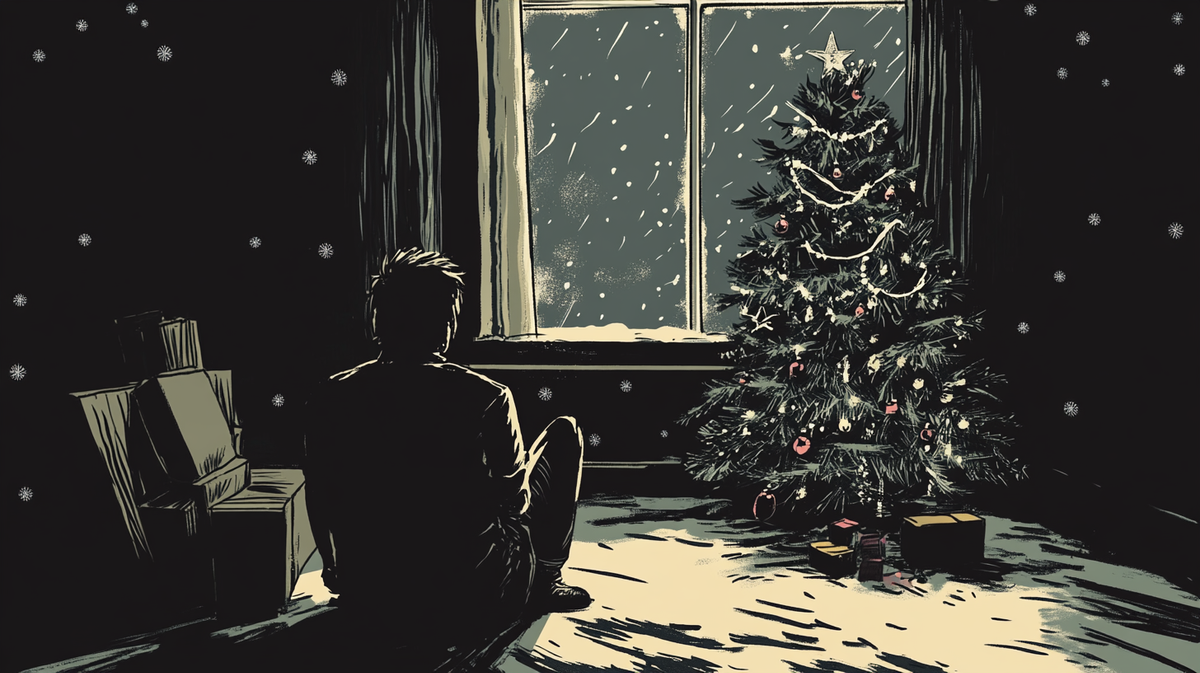
Men are lonelier than before, spend more time online than ever before, and spend less time with other people than before. We know loneliness can have the equivalent impact on our health as smoking 15 cigarettes a day, but this atomization is doing something else.
Men are changing not only themselves but the world around them, sometimes in devastating ways.
Making Men Great Again 💪
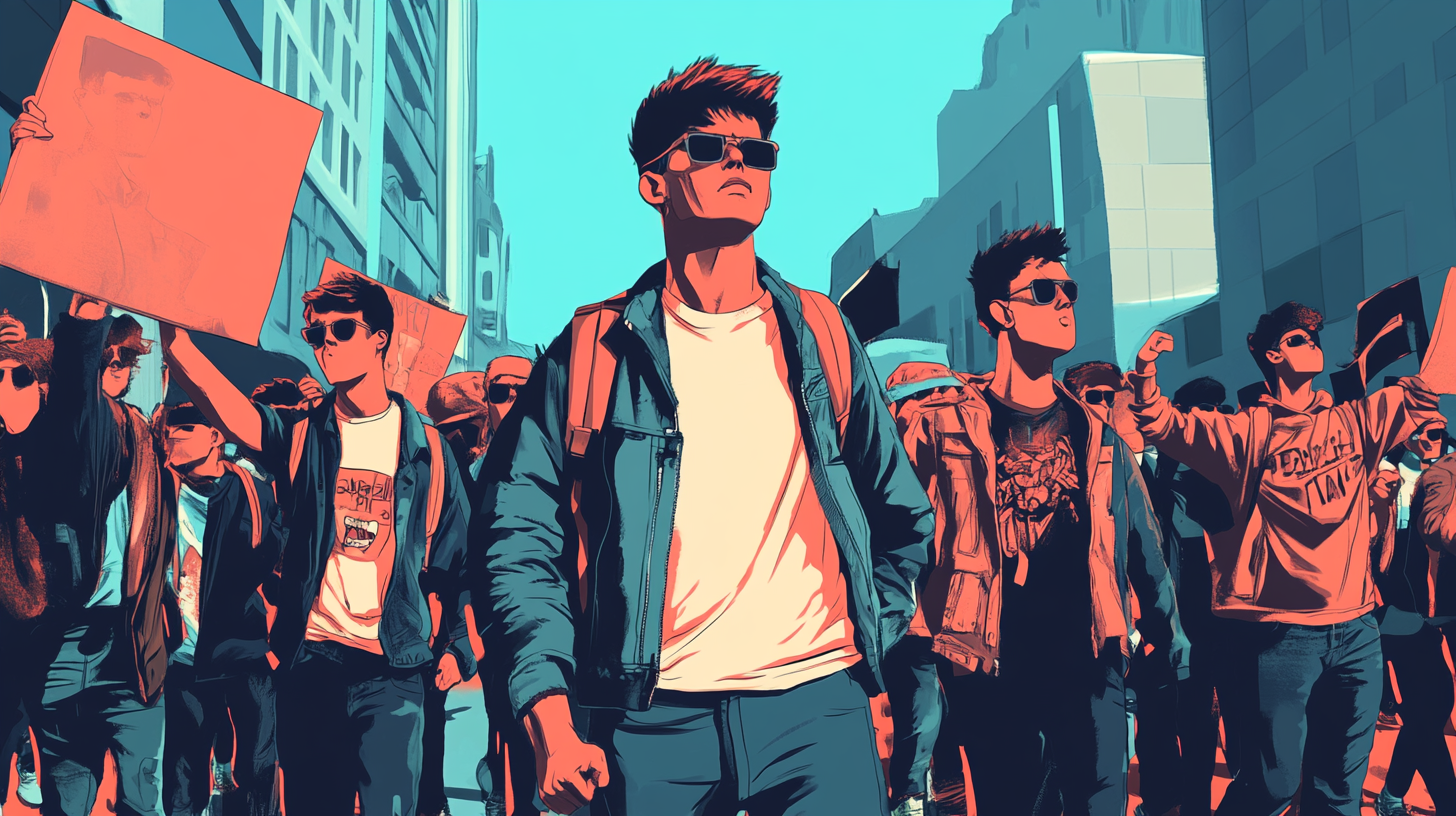
In politics, researchers used to find that while there were different opinions between generations, you tended to think broadly the same as the generation you were in. Not so anymore.
Take a look at this chart, first published by the Financial Times. What you can see is a huge split among 18-29 year-olds across the world.
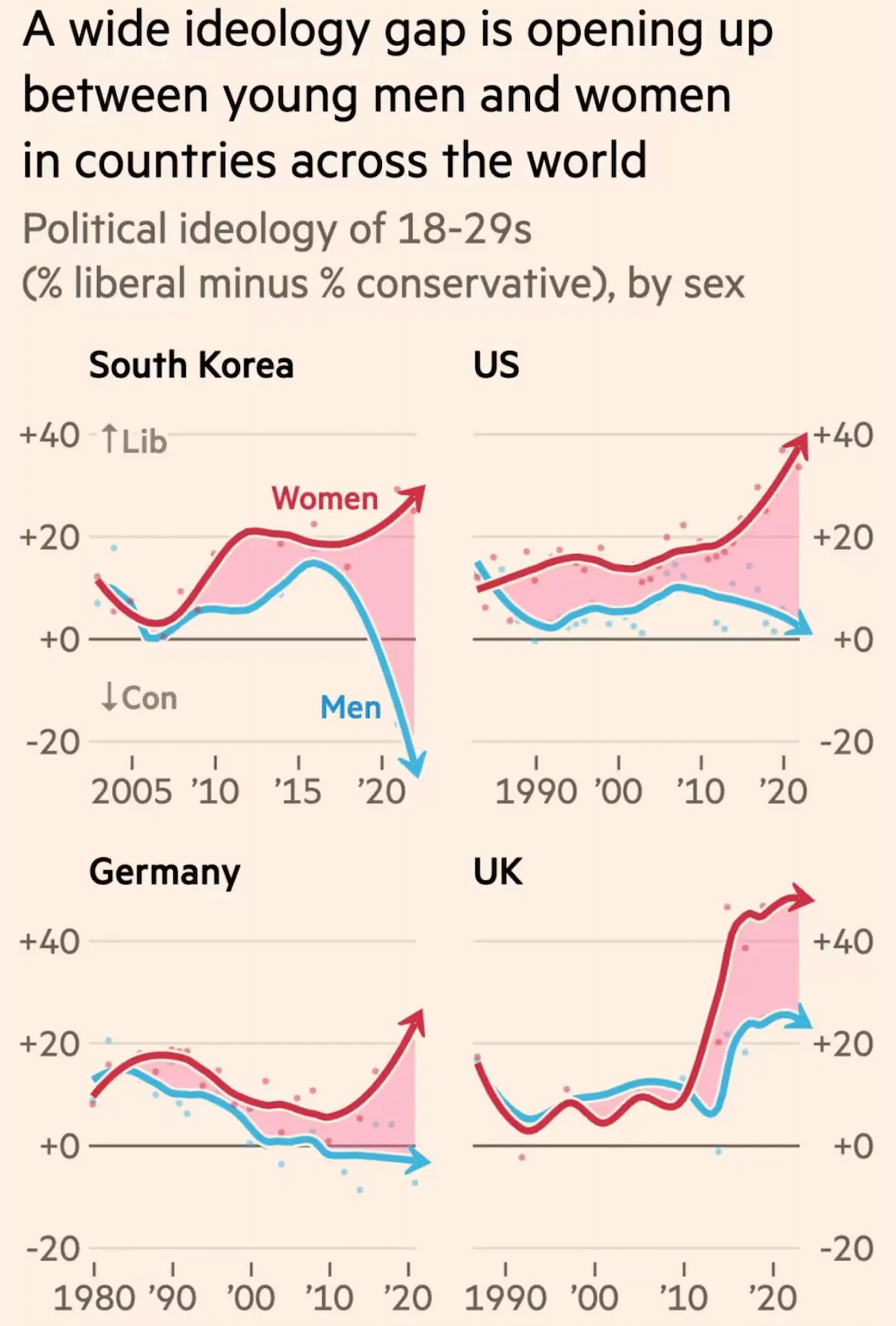
Men have rapidly shifted their political views from liberal to conservative, whereas women have shifted in the opposite direction. This has not only changed a generation, it’s changed politics, too.
In all four of the countries sampled, men’s swing to the right has helped politicians campaigning on controversial issues gain political ground - and in some cases win outright.
If you’re wondering why far-right groups are suddenly dominating the news cycle, that political swing among the young may have something to do with it. In Germany, for example, young men saw left-leaning political issues to be more concerned with feminism, equality, and human rights, issues they felt had nothing to do with them. The same happened during the Trump election, too.
When researchers went looking for answers as to why this shift was happening, they found something strange.

Political scientist Michael Bang Petersen wanted to understand what fuelled conspiracy theories online. He and other researchers designed a study that involved showing American participants blatantly false stories about Democratic and Republican politicians, such as Bernie Sanders, Ted Cruz, Hillary Clinton, and Donald Trump. The subjects were asked: Would you share these stories online?
What they found was strange: the overwhelming majority of recipients were motivated by one thing: a need to destroy the world around them. It didn’t matter what their political views were, the only yardstick that seemed to matter was, did it shake things up?
Peterson called it a “need for chaos”. Do you know who overwhelmingly seemed to have a need for chaos? Men. In particular, white conservative men nostalgic for the patriarchy; independents who are furious about elite institutional failures during and after the pandemic; and culturally conservative, nonwhite men who felt marginalized by racism and economic inequality but also rue the latest waves of #MeToo feminism.
For these men, the world is broken and needs tearing down. They are withdrawing from the world, into their bodies, and see little value in building and maintaining civic society. They don't care about the world, because, as we'll see later, they feel the world doesn't care about them.
Women a no-no 🙅♂️

Young men have become more hostile to feminism than older men, according to a 2023 Equimundo survey.
The rising rejection of feminism among young men is tied, says the American Survey Center to growing feelings that American society (and by the chart above, many other places too) has become more hostile to men.
In 2019, less than one-third of young men reported that men experienced some or a lot of discrimination in American society. Four years later, that number ballooned to 45% of young men believing they were facing gender-based discrimination.

For some young men, feminism has morphed from a commitment to gender equality to an ideology aimed at punishing them directly. That leads to predictable results, like half of men agreeing with the statement, “These days society seems to punish men just for acting like men.”
That leaves many men to draw a similar conclusion: the world no longer needs or wants them. So, they turn away into more solitude, throwing a hand grenade into civic society as they do so. While that may provide a short-term salve to the pain of feeling rejected, it blocks access to something Richard V. Reeves, the president of the American Institute for Boys and Men, calls “neededness”.
This is the idea that we can see and feel the people in our lives need us. These needs might be social, romantic or economic. It could be our children and partners depending on us for care or income, or colleagues needing us to help finish a project, or friends needing us to join them in thrashing their biggest rivals in football. We all need to be needed.
But when we turn our backs on the world, how do we ever get to see that? Instead, men are increasingly feeling more hopeless about themselves and the world they live in. A gendered nihilism is gaining ground. And the numbers are looking increasingly gloomy.

Fifteen percent of young men today say they don’t have a close friend–a five-fold increase since 1990. This loneliness, combined with a range of societal changes and pressures, has resulted in a mental health crisis for boys and men. Today, men are four times more likely than women to die by suicide but ten percentage points less likely than women to access mental health care.
But just because things are looking bad now, it does not always have to be that way.
Re-connecting men 🤝
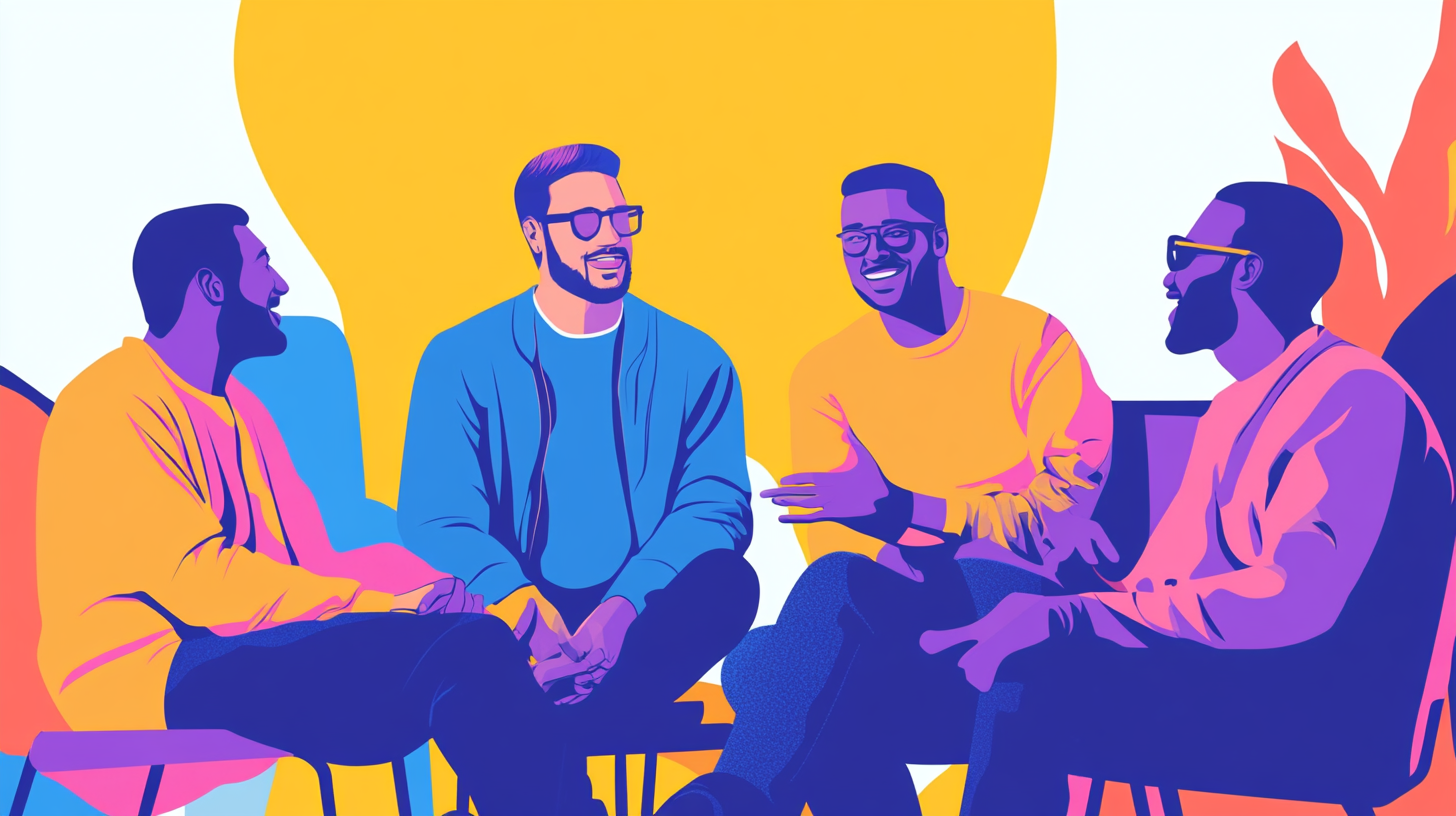
There is quite an angry discussion on what to do with all these solitary men raging online at the moment. It tends to go something like this:
- Women argue the world is far from equal, and more needs to be done to protect women from men.
- Men feel they are being marginalised in favour of women, and want more focus to be on helping them.
Both sides point the finger at the other for why their needs have not been met. This newsletter focuses on men, but the conclusion is relevant for both. Re-connecting men back to the communities they live in does not need to come at the expense of women. This is not a zero-sum game.
Back in 1958, American essayist Arthur Schlesinger wrote an essay titled “The Crisis of American Masculinity”. In it, he argued:
“The key to the recovery of masculinity does not lie in any wistful hope of humiliating the aggressive female and restoring the old masculine supremacy. Masculine supremacy, like white supremacy, was the neurosis of an immature society. It is good for men as well as for women that women have been set free. In any case, the process is irreversible; that particular genie can never be put back into the bottle.”

Many men have been captivated by broader social and political ideas that their future lies in sending women back to the past. That the only way to feel better is to make another group feel worse. They follow those who offer simple solutions to complicated problems, but in reality, they are enriching themselves at your expense.
Many young men feel forgotten, and overlooked. A lot them feel starved of connection and seek solace in a hyper-individualized version of capitalism. In this vision, the only way out is to become ripped, rich, and rulers over everything around them. That message is repeated to them over and over and over again. But there are alternatives.
There has been a steady rise in groups aimed specifically at helping men find their way back to each other, and their communities. Group’s like Andy’s Man Club, The Proper Blokes Club, Men’s Sheds and lots of others do wonderful work.
While men might feel they have been left behind, that doesn’t mean it always has to be this way.
There is always an alternative.
Things we learned this week 🤓
- 🌍 Is global warming increasing depression? This study seems to think so.
- 👭 Do you what lowers your risk of dementia? Making friends.
- 🤔 Scientists say there’s a link between your libido and illnesses like cancer
- 🌴 Surprise! The more able we are to switch off and distance ourselves from work, the greater our emotional well-being.
Just a list of proper mental health services I always recommend 💡
Here is a list of excellent mental health services that are vetted and regulated that I share with the therapists I teach:
- 👨👨👦👦 Peer Support Groups - good relationships are one of the quickest ways to improve wellbeing. Rethink Mental Illness has a database of peer support groups across the UK.
- 📝 Samaritans Directory - the Samaritans, so often overlooked for the work they do, has a directory of organisations that specialise in different forms of distress. From abuse to sexual identity, this is a great place to start if you’re looking for specific forms of help.
- 💓 Hubofhope - A brilliant resource. Simply put in your postcode and it lists all the mental health services in your local area.
I love you all. 💋








